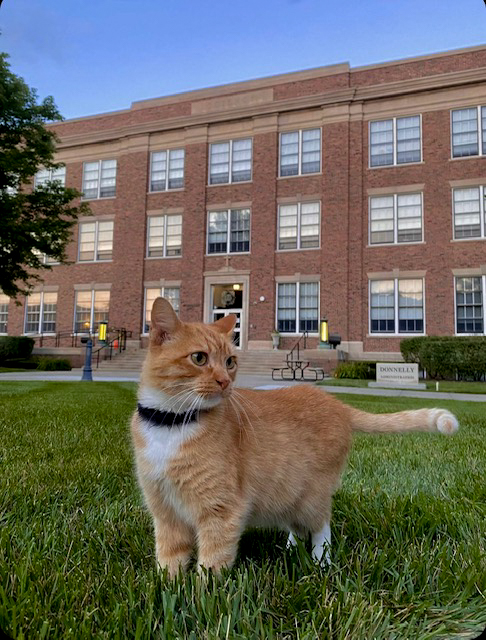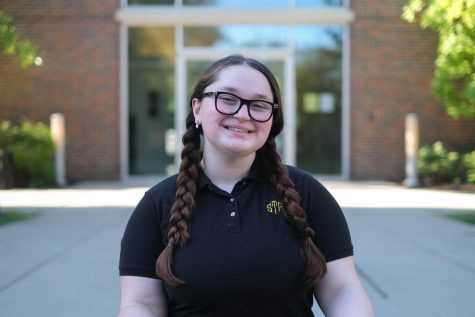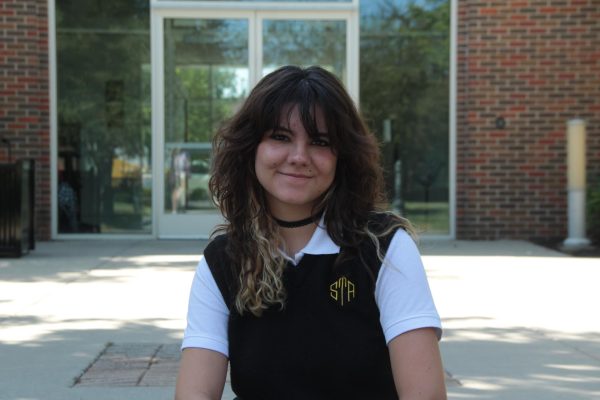In Honor of Truman
October 11, 2022
As junior Lauren Sweeny walked onto campus for dance practice, her tired eyes fixated on Truman who brought happiness to her early morning.
Truman the cat had been the unofficial mascot of STA since 2014, first appearing to administrative assistant Kelly Drummond, and the rest of the STA community when he was little more than a kitten. Over the course of a few years, this orange tabby became a staple part of the STA community.
“Truman was the best because he was our little mascot and spirit animal in a way, even when he was cranky,” alumna Alex Speier (‘22) said.
When Truman first appeared on the STA campus, Drummond was apprehensive to welcome him—concerned about allergies, ownership and the logistics of having a “campus pet.”
“He was on campus every day; he would be outside and the kids would pet him,” Drummond said. “So we put a notice out on NextDoor that this cat was at school and didn’t belong to anybody…so the owners contacted us and said ‘he’s an outdoor cat, he doesn’t like to stay indoors, and that he liked being around people’.”
And thus began Truman’s time on campus, where he happily prowled for approximately eight years, charming hundreds of students during this time.
Truman was cherished by many in the STA community. He was featured in multiple official STA marketing campaigns—such as the promotional brochures given to prospective students, the stickers distributed at special events and even shirts sold in the Star Shop.
Drummond had an exceptionally close bond with Truman, and she believes that he brought a more positive atmosphere to the campus.
“I think he affected the campus in a really positive way,” Drummond said. ”He was [the students’] mascot and he just brought a little bit of sunshine onto our campus.”
In addition to his features in official STA marketing materials, Truman made his own headline in an unofficial, student-run Instagram account with the username “@truman.the cat.” The account has been around since 2016 and was most recently run by Speier who made it her goal to update the account as often as possible.
“Being able to run Truman’s Instagram was such an honor alongside the humorous aspects,” Speier said. “I tried to really revive the Instagram and post pretty often. When I would see Truman in the quad I would always try to chase him down to get a quick picture. I loved getting to capture photos of him with students and spread the love for him. I will miss Truman so much as I know the whole STA community will.”
Senior Triffin Farrar echoes this sentiment that Truman’s presence brought a certain brightness to campus.
“I think that people would just see Truman walking on campus and think, ‘Oh my God, it’s Truman!’” Farrar said. “That cat was annoyed with us, but we loved him…he was just a part of the campus.”
Over time, being on campus became synonymous with interacting with Truman. Junior Alice Coates recalls times when seeing Truman in the quad would lighten her mood.
“My friends and I would come to campus during the summer, but it would be in the evening, and every time that we were here, Truman would just appear,” Coates said.
Truman’s impact on the STA community extended beyond lightening the mood or making students smile. Farrar is the president of PAW club, STA’s pet club that focuses on caring for pets and helping at area shelters, and saw Truman’s death as motive for STA to keep providing a campus animal for students and staff.
“Freshman year we had a service animal coming in every week,” Farrar said. “We were all hanging out with him during activity, especially during finals week. I’m trying to plan something like that this year. I want to have a service agency that will come at least once a week, and then be able to have the students decompress during activity.”
Troy University provides research that suggests Farrar’s push to bring campus pets to STA will bring mental health improvements to students.
The study found that incorporating animals into therapy sessions and owning a pet may help students with psychological issues such as depression, anxiety, and learning challenges, which can lead to students performing better in school and have a better chance of achieving academic success.
Over the years, students weren’t the only ones to interact with Truman; the teachers of STA also fostered relationships with him. Biology and Physical Science teacher Mary Montag held lots of love for the school’s resident feline. !
“It’s just always been so nice to have a little visitor cat,” Montag said. “And Truman doesn’t act like any other cat I’ve ever known. There aren’t many cats that are that comfortable around so many people…but just to have his sweet little presence around was so nice. I miss him. I miss him a lot.”
As the community grieves the loss of Truman, questions about STA establishing a new campus cat have arisen.
“We had Critter, who was a cat that came to STA when I first started working here,” Drummond said.” He was on campus a lot. He was the same [as Truman];he was always laying outside under a tree, and when the bell would ring, he would get up and come to the door. We had another cat that just showed up one day, a little black stray cat. And one of our former principals, Mary Anne Hoecker, took it home because it was getting to be wintertime, and it became her cat but it was here everyday.”
Despite the previous cycles of having a local pet on campus, Drummond is wary of forcing a new campus cat onto the STA community.
“I think it just needs to naturally happen,” Drummond said.” There’s a reason why Critter was here, there’s a reason why Truman was here. And I think there’ll be a reason when we get another cat if it’s what’s supposed to happen.”
Junior Lauren Sweeny is enthusiastic with the idea of a new campus companion.
“I would love to have another campus cat!” Sweeny said. “Although Truman cannot be replaced, I think a new campus cat would make everyone happier.”
Montag mirrored the thought that a new campus animal should just happen naturally and that there was no need for the STA community to rush into “hosting” another animal.
“And I think this is pretty true: we don’t find animals, they seem to find us. Someone will find us, that’s what I think,” Montag said.





